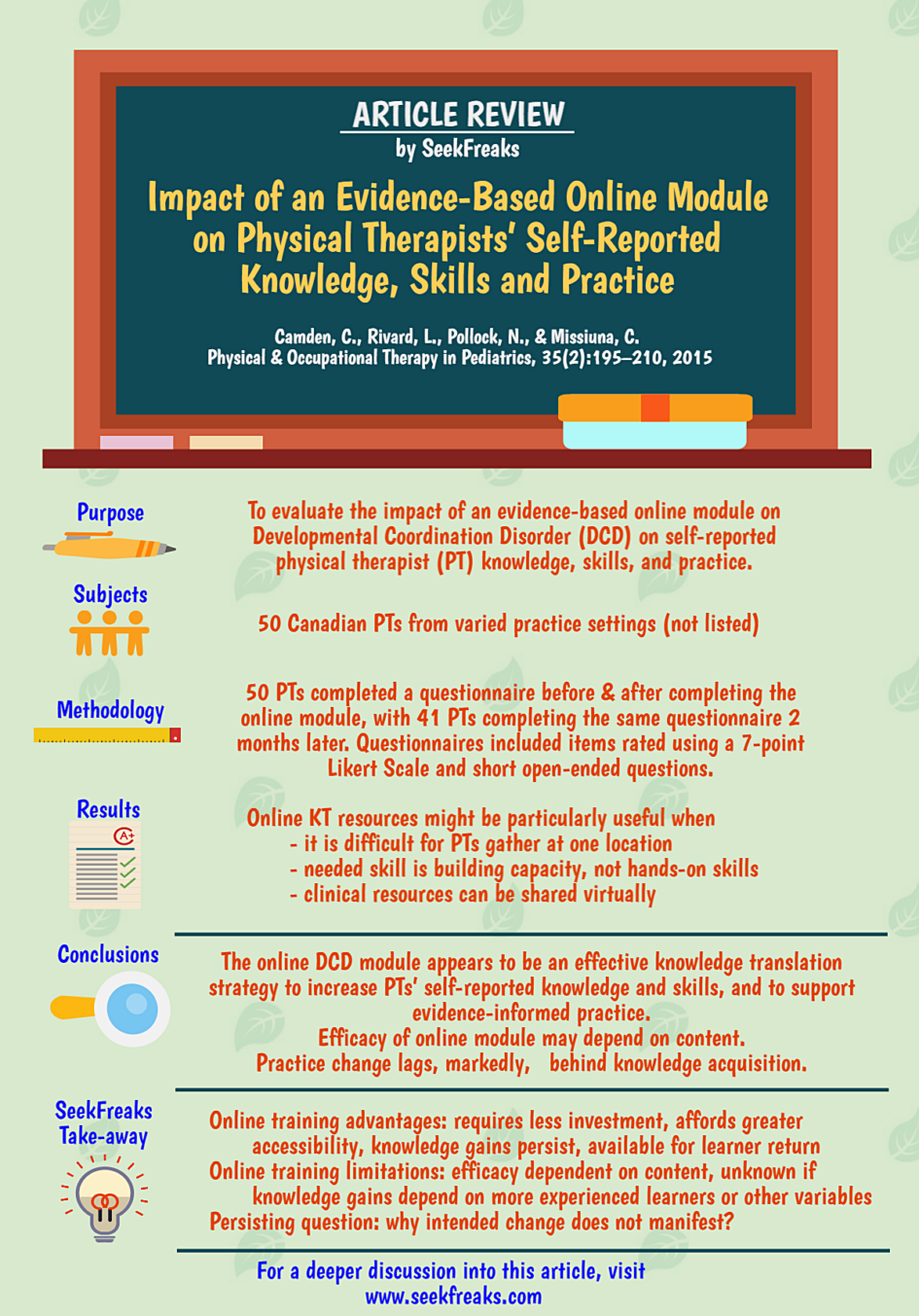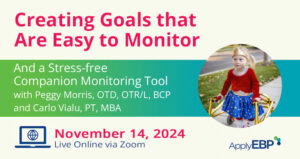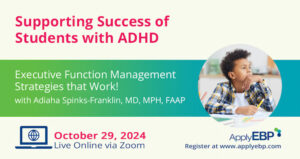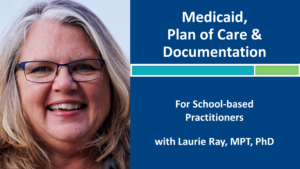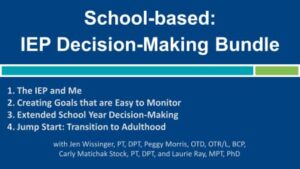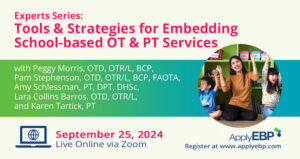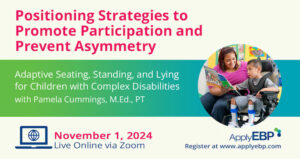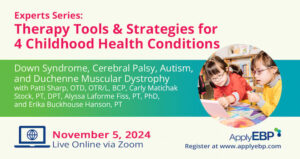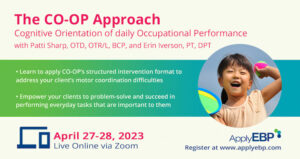[smbtoolbar]
Our last posting was an infographic summary of a clinical practice guideline from the European Academy of Childhood Disability (EACD). That provided a synthesis of current developmental coordination disorder (DCD) research with effective practices to employ. This posting builds on that as we review an article that examines the effectiveness of an online module on DCD and its impact on knowledge translation. C’mon, SeekFreaks, let’s go!
One of the challenging parts of our work is moving evidence into routine practice. With the advent of online education modules, it is interesting to see whether they are effective. So I thought this would be a great article to review not only because it looks at bridging this gap, but also because I need to learn more about DCD and how best to treat it. I LOVE that task-oriented approaches to functional skills were found more effective than process-oriented interventions in a recent meta-analysis of interventions for individuals with DCD. That article is next on my bedtime reading list! This really aligns with how we work in schools.
- 50 Canadian PTs participated, may or may not have clients with DCD currently
- 49 clinicians/1 researcher
- Clinical experience mean 18yrs; SD 9yrs
- 14 did not complete post-questionnaire, just the pre-questionnaire
- 92% reported working with children they suspect to have DCD; 70% working with children diagnosed with DCD
- PTs working with children with DCD
- 18% @ least 1x/wk
- 40% 1x/month
- 42% infrequently <1x/month
- Between post and follow-up (82%) – 76% had worked with 1-10 children with DCD during this period; 46% returned to the module
- Pre-test – 36% of participants were confident providing EBP to children with DCD
- Post-test, immediately following online evidence-based PT DCD module
- post-test 92% reported ‘feeling more confident’
It would have been excellent if participants were asked if they were confident to intervene with children with DCD. Being more confident can still mean you feel uncertain, but 92% is impressive. Participating PTs’ self-reported increased DCD knowledge & skills. However, self-reporting does not have the best reliability. I wonder why did the authors not test actual DCD knowledge & skills to verify? This seems to be something we continue to shy away from, measuring actual effect and/or effectiveness.
- 2 month follow up test
- 34% of participants self-reporting changing one or more aspects of his/her practice
- increased referral for diagnosis
- sharing more information & resources with teachers & families
- Participants appreciated access to resources
- 80% agreed a virtual professional learning community (V-PLC) would assist them to provide EBP (ideas for intervention; other PT perspectives on best approach)
- Those not interested in V-PLC either already had one or did not often access the internet
- Follow up responses indicated PTs felt better equipped (e.g. knowledge gains persisted through the 2 month follow up)
- Despite knowledge gains PTs still struggled to move from impairment to activity focused intervention
- 34% of participants self-reporting changing one or more aspects of his/her practice
While only 34% of participants report actually changing one or more aspects of practice, 86% intended to change following the training . What happened?! Why did 52% intend to change how they intervened but did not?! I also want to know what they did change and how. Also, what did they try and fail to change or was there no attempt to actually change? This is what we really need to understand. What is the root that causes us to stick with practices that are not evidence-based? Is it a failure to motivate? Failure to attempt change? Or do practitioners try to update or change her/his practices and confront something that prevents success?
Online modules have several advantages from a knowledge translation perspective. The training is web-based which affords great accessibility. Additionally, this mode allows the learner to return as often as needed to the content: to refresh understanding, reinforce information and/or access resources. Participants using online module report that it supports them as they alter practices to be increasingly based on current evidence. Training provided only can either stand ‘alone’ or be used to establish and foster professional learning communities (PLCs). It seems if online training evidence continues to demonstrate effectiveness at this level, it is likely to gain prominence. It remains to be seen how knowledge is best translated. Professional learning communities and peer reviews have demonstrated some effectiveness. It seems to me that getting the knowledge is the more straight-forward part, how do we get ourselves to apply it daily?
It is available to you, SeekFreak! And it’s free on CanChild. Note that there are 3 modules: 1 for therapists, 1 for physicians, and 1 for parents & teachers. Whether it impacts your own practice is up to you. And don’t forget, SeekFreaks is always here to help you. We are all in this together. Post your questions below or email us with topics that you would like us to delve deeper in to.
~~~~~~~~~~0~~~~~~~~~~
Seeking Your Views
What has helped you to change or update your practice of PT in schools?
Why is there a gap between knowledge and practice? Is it like eating vegetables? We know we should but we just don’t…
Are there online modules or virtual professional learning communities that we could provide SeekFreaks to provide:
- accountability/check-ins with colleagues for changing practice
- a sounding board
- practical ideas for interventions in school routines?
~~~~~~~~~~0~~~~~~~~~~
Freakishly Fast Poll
[democracy id=”14″]
~~~~~~~~~~0~~~~~~~~~~
Readers of this article also read:
IEP 4.0 – Using Data and Collaboration to Develop a Clear PLEP
Motoropoly 1: Motor Learning Principles in School – Instructions, Feedback & Demonstrations
Article Spotlight: Top 10 Lessons from EACD’s Guideline for DCD
Article Review: Do Teachers Know the Impact of Preterm Birth?
